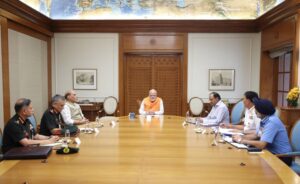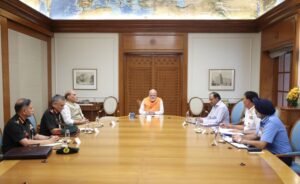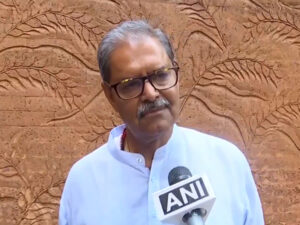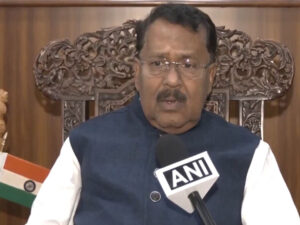Need to maintain constant vigil on northern and western borders, coastline: Rajnath
Onboard INS Vikrant, Mar 6 (PTI) In a projection of India’s growing maritime prowess, Defence Minister Rajnath Singh on Monday addressed the top naval commanders onboard the country’s first indigenous aircraft carrier INS Vikrant in the Arabian Sea and witnessed a mega wargame, amid China’s increasing military posturing in the Indian Ocean region.
As the 43,000-tonne steel behemoth, accompanied by a fleet of over 20 frontline frigates, destroyers and submarines, sailed across the high seas, Singh, sitting inside the Main Briefing Room of the 262-metre-long and 59-metre-tall ship, said that maintaining a “constant vigil” on the northern and western borders as well as the coastline was of paramount importance.
In his address at the inaugural session of the naval commanders’ conference, the defence minister complimented the force for “standing firm” and protecting national interests with courage and dedication while noting that future conflicts will be unpredictable and the armed forces must be ready to deal with emerging challenges.
Before addressing the commanders at the biannual naval conference, Singh, Chief of Defence Staff Gen Anil Chauhan, Navy Chief Admiral R Hari Kumar and other naval commanders witnessed a mega wargame involving Vikrant, the accompanying ships and almost all attack aircraft including MiG-29K deck-based jets.
“It is a historic occasion,” Admiral Kumar told reporters.
In his remarks, Rajnath Singh said that the defence sector will transform the country’s economy. He exhorted the commanders to continue focussing on futuristic capability development to effectively overcome the emerging security challenges in the maritime domain.
“In the next 5-10 years, orders worth over USD 100 billion are expected to be placed through the defence sector and it will become a major partner in the economic development of the country,” he said.
“Today, our defence sector is on the runway, soon when it takes off, it will transform the country’s economy,” he added.
The Chief of Naval Staff said all policy decisions, acquisition-related matters and force planning are being discussed at the commanders’ conference.
“The aim of the conference is to review what are the challenges, where we stand, what are the gaps and how we can take things forward,” he said.
The assets which were deployed during Monday’s drills included warships from the Eastern as well as Western fleets.
Officials said the wargame marked the end of the three-month-long Tropex exercise, billed as the largest ever such drill carried out by the Navy, that was launched in December to test the force’s overall operational capability in view of the evolving regional security matrix.
Two prototypes of the naval variant of indigenously-built Light Combat Aircraft also demonstrated their swift landing on the deck of the sprawling aircraft carrier that was commissioned into the Navy by Prime Minister Narendra Modi in September last.
The decision to hold the first phase of the commanders’ conference onboard INS Vikrant is a “pretty significant move,” a top military official said, hinting that it is a power projection in the face of Chinese assertiveness.
Built at a cost of around Rs 23,000 crore, INS Vikrant has a sophisticated air defence network and anti-ship missile systems and the capacity to hold 30 fighter jets and helicopters.
At the commissioning ceremony of the vessel, Prime Minister Modi called it a “floating city” and said that it is a reflection of India becoming self-reliant in defence.
The flight deck of the carrier is equal to almost two football grounds, said an official.
The official said the conference carries its own significance and relevance in view of the prevailing geostrategic situation in the region.
The second day’s conference will take place in Goa. The latter phase of the conference will be held in Delhi a few days later.
In his address, Singh also made special mention of the credible and responsive presence of the Navy in the Indian Ocean region.
He stated that Mission-Based Deployments of the Navy have strengthened India’s position as a ‘preferred security partner’ of friendly foreign countries in the region.
The defence minister reiterated the need for a huge country like India to be completely self-reliant and not dependent on others for its security.
Singh also commended the Navy for being at the forefront of indigenisation and innovation through the induction of ships and submarines and the development of niche technologies.
On the commissioning of INS Vikrant, he stated that it further reinforced the belief that India’s Naval designing and development is at a promising stage and more progress will be made in the times to come.
The operational demonstrations witnessed by the defence minister included complex aircraft carrier and fleet operations, weapon firings by ships and aircraft and underway replenishment at sea.
In addition, a demonstration of indigenous products, including spotter drone, remote-controlled lifebuoy and fire-fighting was witnessed by the defence minister.
The strides taken by the Indian Navy towards ‘pole-vaulting’ the technological curve, through indigenous sources in the domains of big data analytics, artificial intelligence, laser technology and cryptography were also demonstrated.
The conference serves as a platform for naval commanders to discuss important security issues at the military-strategic level as well as interact with senior government functionaries under an institutionalised framework.
Chief of Defence Staff Gen Anil Chauhan, Army Chief Gen Manoj Pande and Air Chief Marshal VR Chaudhari will also interact with the naval commanders to address the convergence of the three services vis-a-vis common operational environment.
During the conference, naval commanders would also be provided with an update on the implementation of the Agnipath scheme.
The first batch of ‘naval Agniveers’, including women recruits, under the scheme is scheduled to pass out from INS Chilka in March-end.
The Navy said the commanders’ conference would be a significant one and that it will delve into the challenges facing India in the maritime domain.
“The Indian Navy remains focused on being a combat-ready, credible, cohesive and future-proof force and continues to assiduously execute its mandate as the maritime security guarantor of the country,” the Navy said in a statement on Sunday.






